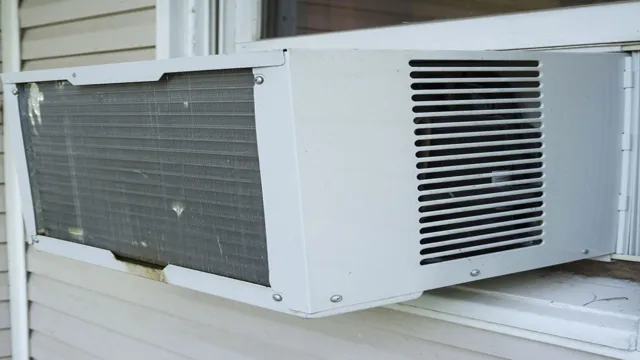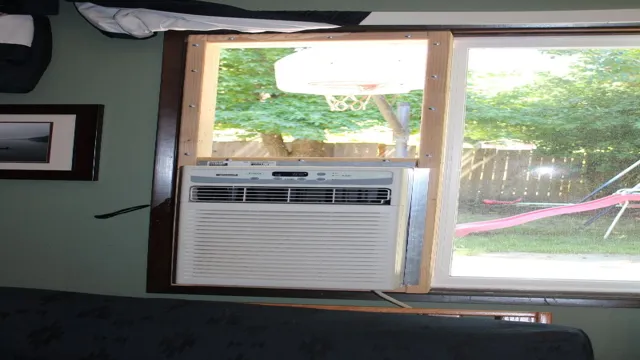If you have a window AC unit installed in your home, you may be wondering if it can withstand exposure to water. After all, summer storms and rain showers are unpredictable, and the last thing you want is for your AC unit to malfunction or even worse – get damaged. The good news is, window AC units are designed to withstand a certain amount of moisture, but that doesn’t mean you should leave them completely exposed to the elements.
In this blog post, we’ll explore whether or not a window AC unit can get wet and how to protect it from water damage. So, let’s dive in and learn more!
How Water Can Affect Your AC Unit
If you’re wondering if a window AC unit can get wet, the answer is yes, and it can affect the unit’s performance. Water affects the AC unit in different ways, and it depends on how long and how much water has accumulated. If water enters the electronic components of the unit, it can cause damage and short circuits, leading to potential fire hazards.
Additionally, water can cause mold and mildew growth, which can reduce the air quality and cause respiratory issues. It may also cause corrosion to the metal parts of the unit, leading to damage and decreased efficiency. To avoid this, ensure that your window AC unit is installed correctly, and always check for any signs of water damage or leaks.
If you notice any, turn off the unit and call a professional to handle it. Regular maintenance and cleaning can also prevent water damage and keep your AC unit running efficiently throughout the hot summer months.
Damage to Electrical Components
As much as we love our AC units, we don’t always give them the care they need to function properly. One of the most significant culprits for AC damage is water. Water damage can affect many of the electrical components in your AC unit, leading to costly repairs if not addressed quickly.
The evaporator coil, blower motor, fan, and control board are all susceptible to water damage. Water can rust or corrode these components, leading to malfunctions or even complete breakdowns. Moreover, water can also cause short circuits, which can lead to serious electrical problems.
It’s crucial to have your AC unit inspected regularly and maintained to prevent water damage and keep your unit running efficiently.

Risk of Corrosion and Rust
Water can have a significant impact on the lifespan of your AC unit by causing corrosion and rust. When water comes into contact with certain materials, it can lead to chemical reactions that break down the metal components of the air conditioning system, causing corrosion and rust to form. This is particularly evident in areas with high humidity levels, as the moisture in the air can accumulate and cause water to drip onto the AC unit, promoting the growth of rust and corrosion.
Over time, this can weaken the structural integrity of the AC unit, leading to leaks, system failure, and costly repairs. Therefore, it is crucial to ensure that your AC unit is kept dry and protected from any water sources to prevent the risk of corrosion and rust. A regular maintenance routine, including cleaning and inspections, can help to identify any signs of corrosion or rust early on and prevent further damage to your AC unit.
How to Protect Your Window AC Unit
If you have a window AC unit, you may be wondering whether it can get wet and how to protect it from water damage. The short answer is yes, a window AC unit can get wet, and water damage can cause all sorts of problems with your unit, including decreased efficiency and even electrical hazards. To prevent water damage, make sure your AC unit is properly installed and sealed to prevent water from seeping in through gaps or cracks in the window frame.
Additionally, you can use a window AC cover to protect your unit from rain and other outdoor elements. Regular maintenance, like cleaning or replacing air filters and checking for clogged drainage holes, can also go a long way in preventing water damage. Don’t take chances with your window AC unit, take the necessary steps to protect it from water damage and keep it running smoothly all season long.
Covering Your AC Unit During Rain or Snow
If you’re wondering whether or not to cover your window AC unit during rain or snow, the answer is yes! Covering your AC unit can help protect it from any potential damage caused by inclement weather. However, it’s important to note that you should only cover the top of the unit, leaving the sides exposed to prevent any potential moisture buildup. You can easily purchase a cover specifically designed for your AC unit, or you can use a tarp or piece of waterproof material.
By taking this simple step, you can protect your AC unit and ensure it continues to function efficiently for years to come.
Proper Installation and Maintenance
Proper installation and maintenance are crucial when it comes to protecting your window AC unit. It’s essential to ensure that your AC unit is installed correctly, with the right power and voltage supply. If not, it may lead to electrical problems and pose a safety hazard.
Once installed, regular maintenance is necessary to keep it functioning at its best. Ensure the filters are clean and free of debris, and inspect the fins and coils for any damage. Clean the exterior and ensure the unit is level and on a stable surface.
Neglecting maintenance can lead to increased energy consumption and reduced cooling capacity, which can be costly and frustrating. In summary, proper installation, and regular maintenance are crucial in protecting your window AC unit, ensuring it runs efficiently, saving you money and ensuring your home remains cool when you need it most.
Avoiding Water Exposure During Cleaning
When it comes to cleaning your window AC unit, it’s important to take precautions to avoid water exposure. Water can damage the electrical components of your unit, leading to costly repairs or even replacement. One way to protect your AC unit is to cover it with a tarp or plastic sheeting before cleaning.
This will prevent water from seeping into the unit and causing damage. Another tip is to use a dry cloth or brush to remove dirt and dust from the exterior of the unit instead of spraying it with water. If you do need to use water, be sure to use a gentle stream and avoid spraying directly onto the electrical components.
By taking these simple steps, you can help ensure that your window AC unit stays in top condition and avoids water damage.
Conclusion
In conclusion, while a window AC unit is designed to cool a room, it is not designed to withstand the elements of Mother Nature. So, if you leave your window open during a rainstorm or forget to seal the unit properly, you might end up with a very wet and potentially damaged AC unit. Remember, just because it’s a window AC unit doesn’t mean it can handle everything the outside world throws its way.
So, keep it dry, seal it tight, and enjoy the cool air inside!”
Yes, a Window AC Unit Can Get Wet, But There are Ways to Protect It
If you have a window AC unit, you may be wondering if it’s safe to use it when it’s wet outside. The good news is, yes, it’s possible to use a window AC unit when it’s wet, but it’s important to take certain precautions to protect your unit. One way to protect your window AC unit is to ensure that it’s securely installed.
You can use brackets or platforms to ensure that your unit is held in place and won’t shift during inclement weather. Another way to protect your window AC unit is to apply a weather-resistant cover. These covers are specially designed to protect outdoor HVAC units from rain, sleet, and snow.
Additionally, it’s important to keep your window AC unit clean and well-maintained. Clean the air filter regularly and check for any signs of wear and tear. By taking these simple steps, you can protect your window AC unit and ensure that it runs smoothly all season long.
Regular Maintenance and Protection Can Help Your AC Unit Last Longer.
Regular maintenance and protection are crucial if you want to extend the lifespan of your window AC unit. One way to protect your unit is by keeping it clean. Make sure to clean the air filters every month, and wipe the exterior of the unit with a damp cloth to remove any dust or debris.
This will allow the unit to function efficiently and prevent it from overheating. Another way to protect your window AC unit is by providing adequate ventilation. Keep the curtains and blinds closed during the day to block out the sun’s heat, and make sure that there is enough space between the unit and any objects in the room to ensure proper airflow.
Lastly, consider installing a cover or shade over the unit to protect it from weather-related damage. With these simple steps, you can save money on repairs and ensure that your AC unit lasts longer.
FAQs
Can a window AC unit get wet from rain?
Yes, if the AC unit is not properly covered, it can get wet from rain. This can cause damage and potentially even electrical hazards. Make sure to cover your window AC unit during rainy seasons.
What should I do if my window AC unit gets wet?
If your window AC unit gets wet, turn it off immediately and unplug it. Allow it to dry completely before attempting to use it again. If there is any damage, contact a professional for repair or replacement.
How can I protect my window AC unit from getting wet?
The best way to protect your window AC unit from getting wet is to use a proper cover. You can find covers made specifically for window AC units at most hardware or home improvement stores. Additionally, make sure that the unit is installed securely and at a slight angle to allow for water runoff.
Is it safe to operate a wet window AC unit?
No, it is not safe to operate a wet window AC unit. This can cause electrical hazards and damage to the unit. Always make sure the unit is completely dry before turning it on again.

